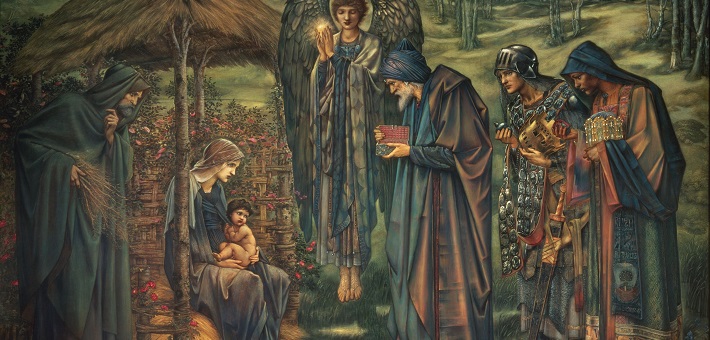Commentary on Matthew 2:1-12
The Greek word epithaneia (epiphany) means manifestation. This festival commemorates the visit of the magi from the east and symbolizes the manifestation of the baby Jesus to the world.
Popular impressions of this event likely come from Christmas cards, staged nativity scenes during Christmas pageants at church, and the lyrics of the carol “We Three Kings.” In a typical Christmas play, all the elements from the infancy narratives of Matthew and Luke are squeezed into one performance—three kings, wearing crowns on their heads, each holding a gift, following a star to Bethlehem, arriving at a stable full of sheep and oxen, where shepherds have also come to see the baby Jesus lying in a manger.
A closer reading of Matthew 2, however, presents a rather different picture.
First, these men from the east were not kings but astrologers. The Greek word magos (magi in the plural) means astrologer or magician. The former definition fits the context here, though the rendering of magi as “wise men” in many English translations lacks precision. These astrologers would study the movement of stars and planets and interpret it as a sign that some important event in the world had occurred.
Second, the text does not specify that there were three of them, nor their names and origin. Later traditions simply assumed there were three of them, given the mention of three gifts. They were then identified as Melchior of Persia/Babylonia, Gaspar of India, and Balthazar of Arabia/Syria. One would think they would be traveling together from the same country! In ancient times, it was customary to send a delegate to honor a new ruler in a neighboring regime. Could these stargazing astrologers be court officials too? In Persia, members of the priestly caste were called magi. Perhaps this could be their point of origin.
Third, the magi did not meet the baby soon after Mary had given birth. Unlike the shepherds who went to Bethlehem right after the angel had told them, “To you is born this day in the city of David a Savior” (Luke 2:11), the magi arrived later. From their initial sighting of the star to their arrival in Bethlehem after a stop in Jerusalem, considerable time would have elapsed. After all, Herod ordered all boys under the age of two to be killed, not just infants a few months or weeks old (2:16). Moreover, verse 11 says, “On entering the house, they saw the child with Mary his mother.” By then, the holy family would have long since left the temporary shelter where the shepherds first visited for more appropriate lodging.
Fourth, the magi were not led by the star the entire way. The song “We Three Kings” has these words: “Field and fountain, moor and mountain, following yonder star. O star of wonder, star of light, star with royal beauty bright, westward leading, still proceeding, guide us to thy perfect light.” In Matthew’s text, they saw the rising of the star, ascertained its significance, and departed for Jerusalem, the logical place to find a Jewish king. Had the star guided them all the way like our modern-day GPS, it would have taken them straight to Bethlehem. Yet it was only after Herod sent them to Bethlehem that they saw the star again, which then led them to Jesus’ exact location.
Despite the glaring discrepancies between the biblical text and the popular version in our minds, let us be reminded of the theological message that Matthew has for us.
Comparing Herod to the magi, the irony is stinging. Jesus, the true King of the Jews, Davidic Messiah, and Son of God was rejected by the sitting ruler of God’s own people. Being only half-Jewish, Herod was both feared and hated. The Jewish historian Josephus painted a picture of Herod as a suspicious and cruel client king, with a history of killing anyone whom he saw as a threat, not least his three sons and his wife. So even though Herod was reminded of Micah’s prophecy that the Messiah was to be born in Bethlehem (Micah 5:2), his response was not to pay homage but to destroy the newborn king. With murderous intent, he tried to trick the magi into divulging Jesus’ location. Not only did Herod fail to get rid of Jesus, his paranoia ended the lives of many innocent Jewish boys (2:16-18). His death shortly thereafter was poetic justice indeed (2:15, 19)!
By contrast, the magi were the “wrong” people doing the right thing. By means of their astrological expertise, these pagans happened upon a sign. How did they know the star signified the birth of a Jewish king? Did they know of Balaam’s prophecy, that “a star shall come out of Jacob” (Numbers 24:17)? We do not know, for the text is silent on that score. Nevertheless, the magi acted on their discovery. They embarked on a long journey, carrying expensive gifts worthy of a king, eager to pay homage. Their efforts led them to an encounter far beyond their expectations. The King of the Jews before whom they knelt was not just another human king, but the Son of the Most High God. The text says that “they were overwhelmed with joy” (2:10), which is an understatement. The wording in the Greek is emphatically redundant: “They rejoiced exceedingly with great joy.” Their homage was elevated into worship. The star and the dream that warned them not to return to Herod assured them that their pursuit had led them to the truth.
Since the magi were gentiles, the festival of Epiphany commemorates the manifestation of the Messiah not only to Israel but to the world. This resonates with the universal outlook of Matthew, whose narrative ends with the Great Commission, when Jesus instructed his disciples to “make disciples of all nations” (28:19). As the magi proclaimed the good news upon returning home, we, too, must do the same with great joy, deep reverence, and persistent enthusiasm.


January 6, 2023